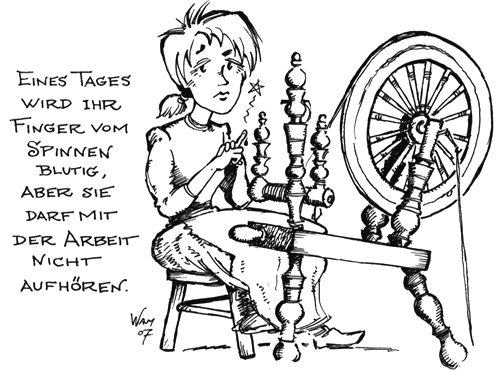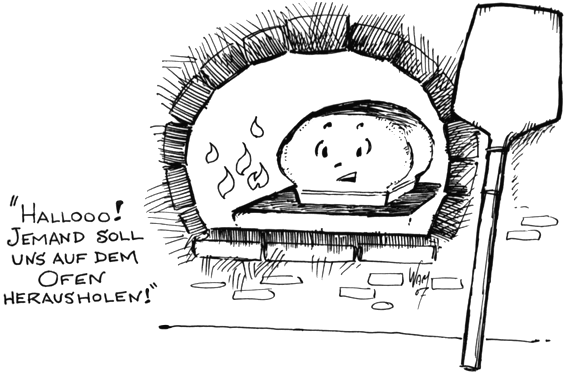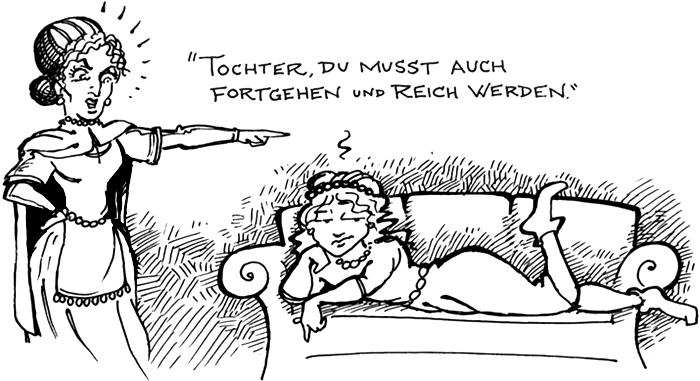Modalverben – Modal verbs
While verbs are used to describe actions, modal verbs add to the meaning by providing some nuance or by suggesting some emotional reaction to an action. Consider the following English examples:
The good girl spins at the well.
The good girl must spin at the well.
The good girl should spin at the well.
In the first sentence, the girl is actually spinning thread right now. In the second one, she must spin because somebody demands it of her (but she may or may not be spinning right now). The third sentence indicates that she has a duty that she is apparently rejecting for something more exciting …
Thus, modal verbs modify other verbs. They are followed by an infinitive (the basic form of a verb, what you would find in the dictionary). There are six – or seven – modal verbs in German: dürfen, können, mögen (+möchten), müssen, sollen, wollen.
These verbs have stem changes and a slightly different conjugation in the singular forms (ich / du/ er/ sie /es).
dürfen – to be allowed to
| ich darf |
wir dürfen |
| du darfst |
ihr dürft |
| er/sie/es darf |
sie dürfen |
Be aware that the negative of dürfen really means “must not” or “may not” (it is a prohibition).
| Da sind zwei Mädchen: Die eine ist verwöhnt und die andere darf nichts tun außer arbeiten. |
There are two girls: one is spoiled, the other one is only allowed to work. |
| Eines Tages wird ihr Finger vom Spinnen blutig, aber sie darf mit der Arbeit nicht aufhören. |
One day her finger gets bloody from the spinning, but she is not allowed to stop working. |
| Tja, das ist leider das Schicksal von allen Waisen in Märchen; sie dürfen am Anfang der Geschichte nicht glücklich sein! |
Oh well, that is unfortunately the fate of all orphans in fairy tales; they are not allowed to be happy at the beginning of the story! |

können – to be able to, can
| ich kann |
wir können |
| du kannst |
ihr könnt |
| er/sie/es kann |
sie können |
Although in American English ‘can’ is often used interchangeably with ‘allowed to’ (‘Mom, can we go home now?’), in German the meaning of these two words are distinct. dürfen indicates the permission to do something, können means the ability/skill to do something.
| Die Spule wird auch blutig, aber das Mädchen kann sie nicht waschen, weil der Brunnen zu tief ist. |
The spool gets bloody too, but the girl can not wash it because the well is too deep. |
| Ich kann das nicht verstehen: Die Stiefmutter sagt dem Mädchen, dass sie in den Brunnen springen und die Spule zurückbringen muss. |
But I can not understand this: the stepmother tells the girl that she has to jump in the well and bring back the spool. |
There is an idiomatic expression with können that you may want to practice using:
| Das kann (wohl) sein |
That’s (entirely) possible |
mögen – to like
| ich mag |
wir mögen |
| du magst |
ihr mögt |
| er/sie/es mag |
sie mögen |
mögen means to like … Unlike the other modal verbs, it is not used to modify a verb; rather, it’s used with nouns: Ich mag Tee lieber als Kaffee (I like tea better than coffee). These nouns have to be in the accusative. To negate mögen, you need to use kein/keine with a noun and nicht if you are negating the mögen itself.
| Das Mädchen |
Warum mögt ihr mich nicht? |
Why don’t you guys like me? |
| Die Jungen |
Wir mögen keine Mädchen. |
We don’t like girls. |
| ich möchte |
wir möchten |
| du möchtest |
ihr möchtet |
| er/sie/es möchte |
sie möchten |
möchten is not really a full-blown modal verb; it is a form of mögen (the subjunctive form) and is used for a softer version of like – namely, it means would like. mögen is used with verbs or with nouns. The nouns are in the accusative here, too.
Two additional, useful expressions: möchte gern (would really like to …) and möchte lieber (would prefer to …)
| Das Studentin |
Ich glaube, ich möchte lieber umziehen. |
I think, I would really prefer to move. |
| Die Mutter |
Ich glaube, du möchtest in der anderen Stadt auch nicht sein. Sie ist chaotisch. |
I believe that you wouldn’t like to be in another city either. It is chaotic. |
| Das Studentin |
Ich möchte das gerne ausprobieren! |
I’d really like to try it! |
müssen – to have to, must
| ich muss |
wir müssen |
| du musst |
ihr müsst |
| er/sie/es muss |
sie müssen |
müssen means the same as the English must in positive (declarative) sentences and in questions. However, when you negate it and say müssen nicht, it is not the same as the English must not (which really means that you are not supposed to or not allowed to something => in German means “dürfen nicht”). Rather, it means that you do not have to do something. In other words:
| du musst |
= |
you must, you have to |
| du musst nicht |
= |
you do not have to (≠ you must not) |
| du darfst nicht |
= |
you must not (you may not, you are not allowed) |
| der Student |
Ich muss Hausaufgaben machen! |
I must do my homework! |
| die Studentin |
Schade! Ich muss jetzt gehen. |
Bummer! I have to go now. |
sollen – to supposed to, should
| ich soll |
wir sollen |
| du sollst |
ihr sollt |
| er/sie/es soll |
sie sollen |
sollen does not really mean the same as should, such as in “you should really be happy that you jumped into the well!” Rather, sollen indicates an expectation or a duty or an obligation.
The more general English should can be expressed in a variety of ways in German: Ach, nimm uns doch aus dem Ofen! (oh, you should really take us out of the oven!) or Sie müsste viel mehr arbeiten! (she should work much more!). müsste is in the subjunctive, and the subjunctive form of sollen (sollte, solltest, etc.) can also mean should in the more everyday sense, as it is used in English.
| das Brot im Ofen |
Halloooo! Jemand soll uns aus dem Ofen herausholen! |
Helloooo! Somebody is supposed to take us out of the oven! |
| das Mädchen |
Ja, ich glaube, das soll ich tun. |
Yes, I believe that I am the one who is supposed to do that. |
| das Brot im Ofen |
Richtig. Du sollst uns herausholen und wir verkohlen nicht. |
Yes, you are supposed to get us out and we won’t burn. |
wollen – to want to
| ich will |
wir wollen |
| du willst |
ihr wollt |
| er/sie/es will |
sie wollen |
wollen is pretty straightforward, and means the same – and is used the same way – as the English equivalent want to. The only difficulty that sometimes arises is in its singular forms, which look deceptively like the English will (as in “sometime in the future I will return to Frau Holle”). The German wollen, in no shape or form, is used to form the future tense! In other words:
| Ich will zu Frau Holle zurückgehen. |
= |
I want to return to Frau Holle. |
| Ich werde zu Frau Holle zurückgehen. |
= |
I will return to Frau Holle. |
| Frau Holle |
Herzlich willkommen! Du willst bleiben? |
Welcome! Do you want to stay? |
| das Mädchen |
Ja, das will! |
Yes, that’s what I want! |
| Frau Holle |
Ich mag deine Arbeitsmoral! |
I like your work ethic! |
Basic
Typically, the conjugated modal verb takes the second position in a sentence or clause, and an infinitive comes at the end of the sentence or clause.
| die Stiefmutter |
Tochter, du musst gehen und reich werden. |
Daughter, you have to go out and become rich. |
| die Stiefschwester |
Ja, ich möchte reich werden. |
Yes, I would like to become rich. |
Modal verbs without infinitives
As you already read above, the modal verb mögen is used without an infinitive, and its variant möchten can be used with nouns as well. However, there are some instances in which other modal verbs may go solo, too.
1. Obvious verbs of motion
If the modal verb is used with a verb of motion, and an adverb of place already clearly indicates that motion, the infinitive can be left off:
| Ich will zu Frau Holle zurückkommen. |
= |
Ich will zurück zu Frau Holle. |
| Ich muss aufs Klo gehen. |
= |
Ich muss aufs Klo. |
| Darf ich wieder nach Hause gehen? |
= |
Darf ich wieder nach Hause? |
You can leave off an infinitive after können if the infinitive would be sprechen (to speak) and the object is the name of a language or tun (to do) and the object(s) make it clear that tun is the omitted element:
| Frau Müller, können Sie Deutsch sprechen? |
= |
Frau Müller, können Sie Deutsch? |
| Ja, natürlich kann ich das tun! |
= |
Ja, natürlich kann ich das. |




